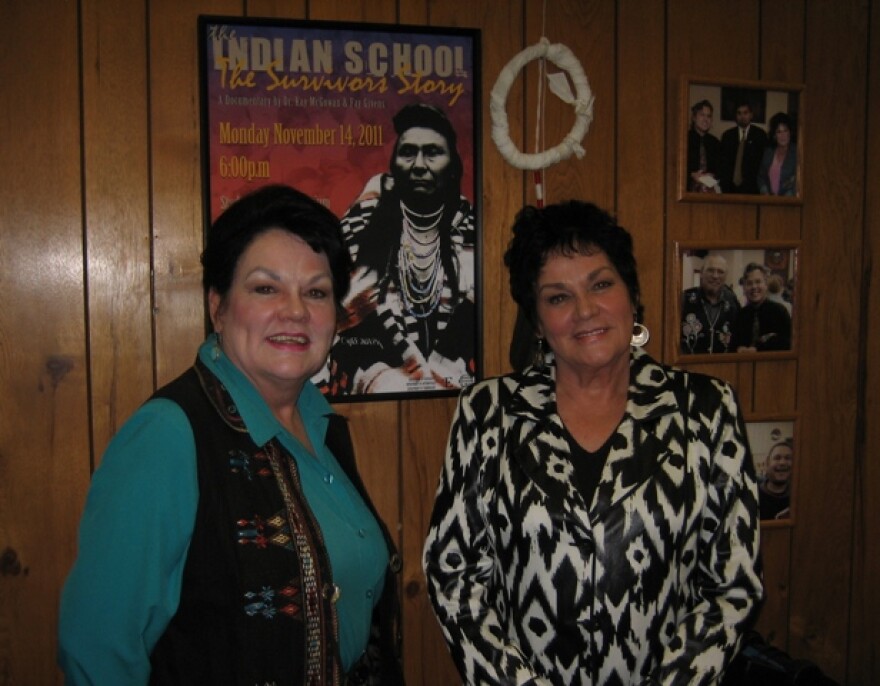By Gretchen Millich, WKAR News
http://stream.publicbroadcasting.net/production/mp3/wkar/local-wkar-999553.mp3
Lincoln Park, MI – Starting in the late 19th century, tens of thousands of Native American children were taken from their reservations to Indian Boarding Schools. The goal was to assimilate Native Americans by replacing their traditional ways with those of the majority of Americans.
In a new documentary, called "The Indian Schools, the Survivors' Story", Native Americans in Michigan tell their memories of the boarding schools. For most of them, the experience was painful and humiliating. WKAR's Gretchen Millich has our story.
Edith Young is a native of Alaska who now lives in Michigan. As a child, she was forced to leave her parents to live at an Indian Boarding School in Seattle. In the film, she says although she's 80 years old, the memories still hurt.
"We were yelled at and slapped. In the 3rd grade, I asked the teacher why she was teaching that Columbus discovered America when Indians were here first. She came over and slapped me across my face. To be humiliated in front of the class, I'll never forget that."
Young and others are part of a "talking circle" at American Indian Services in Lincoln Park. Fay Givens directs the agency. She says the people in the "talking circle" inspired the film.
"They started sharing stories with each other," says Givens. "As time went on, I realized that this story needed to be taken to a broader audience, and that most people in this country had never heard about what happened to native people and the requirement that they go to these boarding schools. These are the survivors of those schools."
Givens worked on the documentary with her twin sister, Kay McGowan, who teaches cultural anthropology at Eastern Michigan University. McGowan says the purpose of the film is to shed light on very dark period in American history.
"My sister and I decided this was something that needed to be done while the people were still here to tell their story," says McGowan. "The last schools closed in the 1990's. This went on for 125 years. A total of 180,000 Native American children were taken from their families."
The children were not allowed to speak their native language or wear traditional clothes or do anything related to their Native American culture.
"The whole move was to make Indian children white," says McGowan. "Of course, at the end of the school experience, the children still weren't white. They were not accepted by white mainstream America. When they went back to their tribal homelands, they didn't fit in at home any more either."
There were reports of widespread physical and sexual abuse at the schools. McGowan attributes the problems of some Native Americans, such as alcoholism and suicide, to growing up in a boarding school. Another tragic consequence: generations of Native American children were not raised by their own parents and never learned how to be loving parents themselves.
Warren Petoskey is an Odawa Indian from Michigan. Several of his ancestors were forced to go to the Indian Industrial School in Mt. Pleasant. In the documentary, Petoskey says he grieved for the life his parents and grandparents were denied, and for the effect that had on his generation. Petoskey says there is a way for survivors to recover their cultural identity, through Native American traditions.
"I'm glad today to say that I can go to sweat lodge ceremony and that I can dance with my people," says Petoskey. "I can smoke my pipe, I can play my flute and sing those songs. I can be with my people and be accepted."
Fay Givens says survivors of Indian boarding schools often blocked out the entire experience, and she hopes the film will help more of them reconcile with their past.
"I think the "talking circle" has allowed many of them for the first time to express what happened to them," says Fay Givens. "That's the beginning of healing."
Givens and McGowan have presented their film to college students, and it's been shown on a reservation in Michigan. It's for sale at some Native American museums and tribal councils around the country. They're hoping that it will also reach an audience beyond Native Americans, especially counselors, teachers and judges who work with Native American populations.

